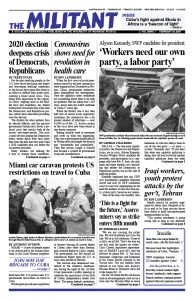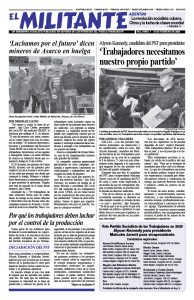Deadly attacks by militias organized by Shiite cleric Muqtada al-Sadr as well as by Iraqi security forces have failed to quell anti-government demonstrations in Iraq.
“This protest movement is going strong and as long as our demands haven’t been answered, we will remain here,” Sajjad Muyed told Al Jazeera. Muyed, a college student, has spent more than 120 days at the tent encampment in Tahrir Square in Baghdad.
Since the start of October working people and youth have held demonstrations and organized sit-ins in the capital and cities across the south of the country.
Demonstrators in Tahrir Square and other protest encampments are demanding more jobs, the provision of electricity and water, and a halt to government corruption. They want an end to government by parties that have held office since a political setup organized along sectarian religious lines was imposed after the 2003 U.S.-led invasion. And they oppose the Iranian rulers’ extensive military and political interference in their country, as well as that by Washington.
Iraqi security forces fired at crowds in the southern city of Nasiriyah Feb. 10, killing a demonstrator.
More than 600 Iraqis have been killed in less than five months of protests.
Al-Sadr called Feb. 5 for his supporters to help security forces. Hours later at least eight protesters were killed in Najaf, when al-Sadr’s militia members stormed the protest site there, firing live ammunition and chasing down protesters trying to flee. People rushed to donate blood after hospitals appealed for help to the injured.
“The Sadrists and SWAT forces accompanying other, unknown militia members opened fire at the protesters,” 25-year-old Alaa Mohammed Hussein told the Middle East Eye news outlet. Nearby Iraqi security forces “did nothing to prevent them killing peaceful demonstrators.”
Following the assaults in Najaf and Karbala, people in the provinces of Nasiriyah, Muthanna and Wasit and the city of Basra poured into the streets in solidarity. “Najaf we will never forget you, Baghdad with you,” chanted demonstrators in Tahrir Square.
On Feb. 7 al-Sadr’s forces took over and evicted demonstrators from the “Turkish Restaurant” tower overlooking Tahrir Square, tearing down portraits of martyred protesters displayed there. Several protesters were seized, “tortured and beaten” for hours, Osamah, a 26-year-old from Baghdad, told Rudaw.
Al-Sadr initially backed anti-government protests in October, but turned on them after Mohammed Allawi was appointed prime minister in early February. Al-Sadr has increased his collaboration with Tehran, after previously opposing the Iranian rulers’ intervention in Iraq. He heads the largest coalition of parties in the Iraqi parliament.
Following Allawi’s nomination as prime minister, thousands of students from different universities in Baghdad and in several cities in the southern provinces marched to protest his appointment.
“They are not listening to us, and want to impose someone from the political parties on us, which is unacceptable,” Muyed told Al Jazeera.
Syrian gov’t intensifies Idlib attacks
While the Iraqi government has failed to prevent actions aimed at bringing it down, political instability elsewhere in the Middle East continues to be fueled by conflicts between rival capitalist powers.
In neighboring Syria, President Bashar al-Assad is escalating military assaults on opposition-held areas in Idlib province, including assaults on forces allied with the Turkish government. Thirteen Turkish soldiers have been killed in these attacks since Feb. 2, as Assad steps up efforts to retake control of the area, backed by Moscow and its forces stationed in Syria.
Turkish President Recep Tayyip Erdogan threatened to unleash airstrikes and ground attacks against Assad’s forces Feb. 12. He has sent some 5,000 Turkish troops into Idlib in the past month.
The Syrian government offensive is exacerbating the disastrous conditions working people face there, with 700,000 people fleeing their homes in the past two months, heading toward the Turkish border.

